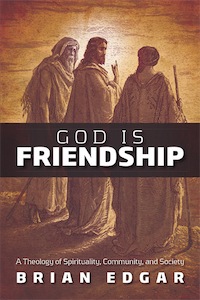 A review of God is Friendship by Brian Edgar. Published by Seedbed.
A review of God is Friendship by Brian Edgar. Published by Seedbed.
It’s always worth considering the metaphors for how we relate to God, and how meaningful they might be to a male audience. So the Bible refers to God as our father, and this might be a difficult metaphor depending on your own relationship with your earthly father. It also makes blokes feel like perpetual kids.
The marriage metaphor is another one that is used, but its meaning is impacted by a person’s own experience with marriage, either their own or their parent’s. It is also hard for men to imagine what it is like to relate to Jesus as the bridegroom …
Which is why it is refreshing to spend some time reflecting on the metaphor of friendship, or perhaps we should say mateship, in the Bible.
As Jesus was preparing for the inevitable, his arrest and trial, he held a final meal with the disciples, and he called them his friends. His relationship with them was transformed from teacher / student or master / servant, to one of friendship.
But what sort of friendship can we experience with God, and why don’t we hear much about friendship in churches today? Australian Brian Edgar has recently published a study of God and Friendship, where he focuses on a theology of friendship, exploring the “history of friendship, its biblical foundations, its theological meaning, and its spiritual significance.”
So why did friendship disappear as an important topic of public and theological debate? Edgar traces the history through Jesus (John 15:15: “I no longer call you servants … but friends”), Paul and his use of friendship language in Acts and Philippians (“one mind”, “bear one another’s burdens”), the church fathers including Ambrose (“So he who does the will of God is His friend and is honoured with this name… He who is of one mind with Him, he too is His friend.”), Aelred of Rievaulx (“God is friendship”) and Thomas Aquinas (“God is our chief friend”).
From there the trail goes cold. Possibly because of the objections typically made against friendship that are current through to today:
- Some say that friendship is too spiritual, the metaphor is too close. We cannot imagine God as literally our father, but we may mistakenly treat God as we do other friends.
- Others question whether friendship with God can be reciprocal, noting that scripture never describes Jesus or God as friends of anyone. Edgar points that it is God and Jesus who initiate friendship offers in the Bible.
- Finally, some argue that one can talk about God and Jesus being the friend of groups, including the disciples, rather than the particular friendships of individuals. Edgar points out that, ironically, Jesus twice refers to individuals as his friends: one who was a traitor, Judas, and the other was dead, Lazarus!
There are five very nice features of Edgar’s writing that bring fresh emphasis to the significance of friendship for the church and the world:
- He has a view of friendship as something offered to us, which we can offer to others: “Salvation is a victory won (over sin and death), a status achieved (from guilty to innocent), a freedom granted (release from sin) and a friendship entered into.”
- There is a corrective to the dominant model of servanthood in terms of leadership and ministry within the church. Edgar points out that John 15:15 moves beyond serving to friendship, which is more free, risky, passionate and equal; and which more truly reflects God’s love for us.
- He talks about friendship as the “primary expression of Christian love”: with its focus on a free, mutual, creative, intimate, participative and growing relationship, modelled within the Trinity: Father, Son and Spirit.
- He has a long term view of friendship: that it is the metaphor of relationship that will exist into eternity, and the best description of what happens after we die, that I, that all people and all things will drawn into a friendship union with Jesus.
- Finally, Edgar’s final chapter on the virtue of friendship, sees an opportunity for the church’s expression of friendship to be transformative in society, as we seek to befriend the marginalised like Jesus, and emphasise the grace, generosity, equality, joy, courage and hope of friendship as basic values for organisations and public policy.
I hope that Brian Edgar’s book will breathe new life into this metaphor of relationship with God, and that the church might embrace friendship as a model for personal, church and community renewal. Perhaps the area which still needs to be explored is: how can we develop this virtue of friendship?
KARA MARTIN is the Associate Dean of the Marketplace Institute, Ridley Melbourne, has been a lecturer with School of Christian Studies, and Wesley Institute and is an avid reader and book group attendee. Kara does book reviews for Hope 103.2’s Open House.
Email This Story
Why not send this to a friend?

